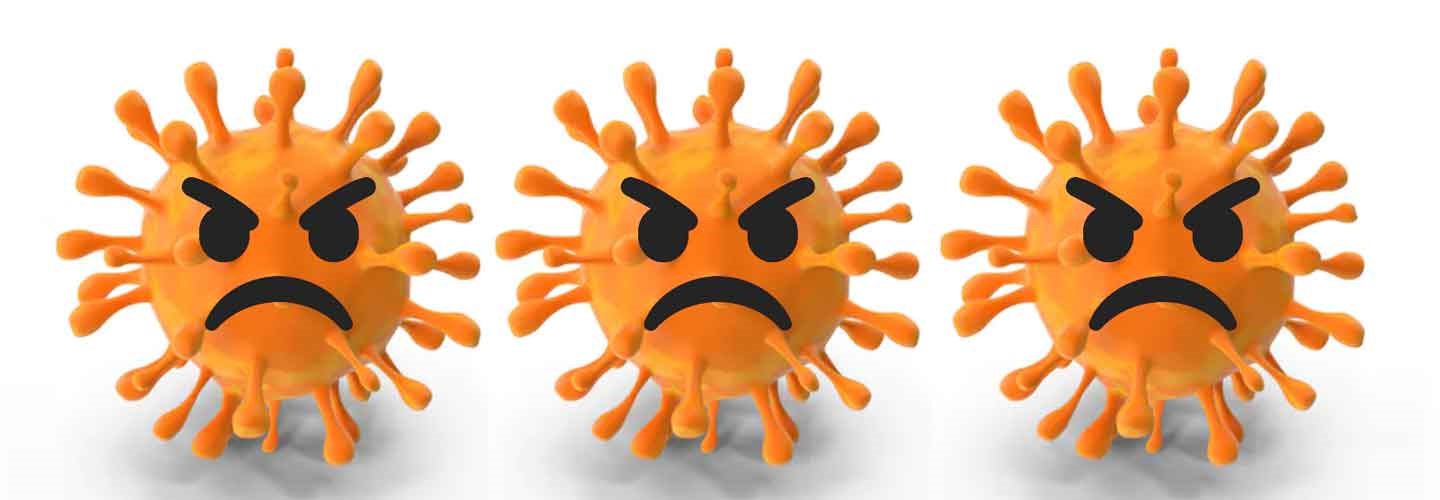Fighting Off that Massive Invisible Bully: Coronavirus, PTSD, and the COMT gene in Kids
- Home
- Blog

Biohacking Your Mental Health Ecosystem: Part Four
The coronavirus continues to “bully” children around the globe with no end in sight. Learn how some children with a gene known as COMT Met/Met are more vulnerable to developing PTSD as a result of this kind of trauma, and how genetic testing and Trauma-Focused Cognitive Behavioral Therapy can help.
Reader, do you remember your childhood bullies? Sure, some of us didn’t suffer any, but most of us did—that one kid who picked on us for our good grades or our bad hair, our glasses, our lack of hand-eye coordination on the basketball court, our race or religion, or anything in between. Most bullies love to poke at any characteristic that could possibly be construed as a weakness or liability, and rather than fall prey to their sneers, most of their victims try their best to structure their time avoiding them at all costs. In my own childhood, I learned that by tutoring one of the bullies in math, he became my bodyguard, but nonetheless he couldn’t protect me from the disparagement at the bus stop over my religion and academic achievements, which only stopped after I learned judo and took one of them down. Nonetheless, their remarks still sting many years later.
But what if I told you about a bully who would pick on you simply for breathing their same air—and to make it worse, what if I told you that no matter how hard you tried, this bully was seemingly unavoidable, omnipresent at every turn, haunting every corner of your life, demanding every ounce of your brainpower to evade them and even appearing in your dreams? And what if I told you this bully was powerful and mean enough to victimize not just you, but the entire world? Reader, this scenario is no nightmare or fantasy—it’s what we are living through at this very moment. For almost the entirety of 2020, our entire planet has been hounded by an invisible bully who is wreaking havoc on our economy, our physical wellbeing, and our mental health. With every passing month, with no end in sight, this bully is endangering not only our present moment, but our futures, too. Human bullies are bad enough—and without psychiatric intervention, their influence in our lives can cause lasting harm. What, then, are the repercussions when our biggest bully is a global pandemic—and what can we do to fend off this massive, looming villain?
The coronavirus is a collective traumatic event, and after all is said and done, millions will suffer post-traumatic stress from the damage it is causing us. In this blog, I’ve called on my colleagues, Dr. Mark Novitsky and Dr. Stephanie Wolf, to share our insights into the significance of this trauma, how our genes may play a role, and how certain therapies may help individuals—especially school-age children—get through this pandemic in one piece. Let’s dig in.
The Coronavirus and PTSD: A Mental Health Pandemic
Even before Coronavirus-SARS 2, many in our society were struggling with learned helplessness and social defeat stress, which are environmental stressors that have negative epigenetic consequences for our mental health, particularly for those with “orchid genes.” Half a year into the pandemic, many of us have already faced significant stress due to the coronavirus spread. Some individuals are suffering from the isolation of shelter-in-place orders; others are struggling to come to terms with being unable to see loved ones in faraway places. Others still have suffered even more directly, either having contracted the virus themselves or losing someone in their lives and being unable to properly grieve in light of social distancing and restrictions on group gatherings. Much has already been written about the mental health crisis this pandemic is causing globally: the consequences of the coronavirus both elevate the risk of anxiety and depression in many individuals and exacerbates the symptoms felt by those who already have unremitting emotional pain. But there’s another mental health crisis lurking in our future: as time passes and the virus continues its bullying course through our culture, more individuals will suffer not just the trauma that COVID causes, but also the post-trauma of its after-effects.
Studies on past pandemics, from SARS to EBOLA to AIDS, have all indicated high numbers of PTSD not just on those who contracted these various viruses, but on those who have witnessed deaths and those who have experienced a fear of infection or stigmatization. As one analysis states, “of the 116 people who survived ebola in Liberia, 66% met the DSM IV diagnostic criteria of post-traumatic stress disorder three years after the outbreak.” Some are more vulnerable to PTSD than others—for example, individuals on the front lines of viral outbreak (think doctors, nurses, and other healthcare professionals). Vulnerabilities also lie in the less educated populace—including children, who do not yet have the tools to cope with such challenging times. Our very genetics can play a significant role in developing PTSD in times like these. As I’ve said in prior blogs, the more we know about these factors, the more proactive we can become, and be on the lookout for symptoms and get help in time to treat mental health crises before they begin. In the below section, my colleague Dr. Mark Novitsky explains the role genes can play in developing post-trauma in children, and why some are more vulnerable and others.
Are My Genes Pre-Disposing Me to COVID Trauma?
According to Dr. Novitsky, there has been no time in a young child’s lifespan that has presented more uncertainty than the present moment. The COVID-19 pandemic has forced children to adapt to online school, socially isolated them from friends, and has potentially exposed them to financial stress and relationship stress affecting parents during these difficult times. To make it more challenging, recent exposure to racially driven acts of violence has only further added to the trauma. This “perfect storm” of trauma has the potential to activate the part of the brain called the Amygdala (the “fear center” of the brain) and subsequently trigger your child’s mind to be hypervigilant.
While we are still determining the long-term effects of the pandemic medically, there is no doubt that there will be significant mental health ramifications—so much so that many experts are predicting the mental health aftermath of COVID may itself be the next pandemic we face—pandemic anxiety has already begun.
These are trying times—but what if you had “inside information” about how your child would react to traumatic events? We actually do. Scientists have uncovered certain genes in the human genome that can help predict how an individual might react to trauma and similarly how they might be best treated. As just one example, COMT is an important enzyme that regulates the breakdown of dopamine in your child’s frontal lobes. You may be thinking: Isn’t it important for my child to have dopamine for motivation, executive functioning, motor control, arousal, reinforcement, and reward? Yes—however, in the presence of significant trauma, “dopamine flooding” may occur if the COMT gene is not able to adequately break down the dopamine in the frontal lobe. Too much of this focus chemical could result in excessive focus, or rumination, and an overactivation of the fear response in the amygdala that creates a prolonged and exaggerated stress response. We see that individuals with efficient breakdown of dopamine (i.e. the Val/Val variant, who are known as “dandelions” or “warriors”) are less likely than those with slow breakdown (i.e. the Met/Met variant “orchids”) to develop PTSD. In fact, children with this orchid variant are less able to process fear emotions when exposed to trauma, as demonstrated in this pioneering study which included fascinating MRI images of how “orchid” vs. “dandelion” children process traumatic experiences. The “dandelions” became more resilient, and the “orchids” were more likely to develop PTSD and depression. Knowing your child’s unique DNA code can help guide your doctor’s medication and supplement interventions as well as critical non-pharmacologic therapeutic interventions including a specific form of talk therapy.
What Can I Do if My Child is Suffering Trauma from COVID?
If your child is struggling right now, they are certainly not alone. Getting a genetic test to better understand their mental health profile is a good first step to take toward helping ease their suffering in this crisis, and Dr. Stephanie Wolf is an expert in a specific form of therapy that can further aid their mental health. Dr. Wolf’s practice specializes in Trauma-Focused Cognitive Behavioral Therapy (TF-CBT), an evidence-based treatment for children who have experienced traumatic events. According to Dr. Wolf, this psychological treatment is the “gold standard” for child trauma and can be utilized with children and adolescents ages 3 through 18. TF-CBT teaches children and caregivers coping skills that they can use to manage trauma symptoms. It also helps families process the traumatic experience and enhances the child’s future safety and development. Treatment includes individual sessions for the child, individual sessions for the child’s caregivers, and joint sessions for both. The therapy typically takes 8 to 25 sessions to complete. Most children have significant reduction in trauma symptoms after treatment and are able to return to more positive levels of functioning.
Reader, the coronavirus is a massive global bully, big enough to engulf the entire world with its fear-inducing abuse—but that doesn’t mean we can’t fight back. With resources such as Genomind’s Professional PGx genetic testing and TF-CBT, we can help to prevent trauma from occurring in our children’s lives, and give them back their hope for a better future.
In our next blog related to “Biohacking Your Mental Health Ecosystem” we will tell you the story of a child suffering from COVID-19 – triggered PTSD, and how genetic testing and TF-CBT were used to guide a positive treatment outcome.
Until then, be safe and stay well!
.png?width=144&height=144&name=Untitled%20design%20(34).png)



